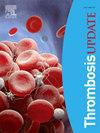Venous and arterial thromboembolism in out-patients with inflammatory bowel disease: a single center study
Q4 Medicine
引用次数: 0
Abstract
Background
Patients affected by inflammatory bowel diseases (IBD), namely Crohn's disease (CD) and ulcerative colitis (UC), are at risk for thromboembolic events (TE). Patients with active/relapsing disease and those needing hospitalization and surgery show the highest risk. The thrombotic risk in out-patients with IBD is underestimated and poorly investigated.
Objectives
to evaluate the prevalence, clinical features and risk factors for thromboembolism in IBD out-patients.
Methods
From May 2021 to September 2023, consecutive IBD out-patients were evaluated for the presence of cardiovascular risk factors (smoking, arterial hypertension, diabetes mellitus, hypercholesterolemia) and history of TE. Patients with a history of TE (including coronary heart disease, stroke, transient ischemic attack- TIA-, deep vein thrombosis- DVT-, superficial vein thrombosis- SVT-, pulmonary embolism- PE-) were studied for thrombophilia.
Results
A total of 302 IBD outpatients were included in the study (154 CD; 148 UC; mean age: 41.23 ± 17.4 years). Twenty-three patients (23/302; 7.6 %) showed a thrombotic event: 14 UC patients (14/148; 9.4 %) and 9 CD patients (9/154; 5.8 %).
Among the 23 patients with TE, we observed 12 arterial thromboses (12/23; 52.2 %), including 7 cases of Myocardial Infarction (7/12; 58.3 %), 3 Ischemic Stroke (3/12; 25 %), 2 TIA (2/12; 16.7 %); and 11 episodes of venous thromboembolism (VTE) (11/23; 47.8 %), including 7 DVT (7/11; 63.6 %), 2 SVT (2/11; 18.2 %) and 2 PE (2/11; 18.2 %).
Among the 11 VTE patients 6 were affected by UC and 5 patients were affected by CD. 5 out of 12 arterial thrombosis patients were affected by CD and 7 patients by UC.
In the univariable analysis, several predictors showed a significant association with TE, including IBD activity (OR = 4.98, 95 % CI: 1.93–12.81), arterial hypertension (OR = 4.44, 95 % CI: 1.86–10.60), hypercholesterolemia (OR = 4.68, 95 % CI: 1.38–15.92), hematologic disease (OR = 6.55, 95 % CI: 1.13–37.85).
IBD activity (OR = 7.03, 95 % CI: 2.48–19.85), arterial hypertension (OR = 3.35, 95 % CI: 1.32–8.50), hypercholesterolemia (OR = 5.06, 95 % CI: 1.21–18.77), hematologic disease (OR = 12.58, 95 % CI: 1.87–69.87) and immune disease (OR = 19.39, 95 % CI: 1.29–289.60) were significantly correlated to TE events at multivariable analysis.
Conclusions
Out-patients with IBD presented a low but not negligible risk of TE, mainly correlated to the common cardiovascular risk factors described in the general population and to the presence of immunological and hematological disease. Clinicians should not underestimate thrombotic risk in these patients.
炎症性肠病患者门诊静脉和动脉血栓栓塞:一项单中心研究
受炎症性肠病(IBD)影响的患者,即克罗恩病(CD)和溃疡性结肠炎(UC),具有血栓栓塞事件(TE)的风险。活动性/复发性疾病患者和需要住院和手术的患者风险最高。IBD门诊患者的血栓形成风险被低估且调查不足。目的了解IBD门诊患者血栓栓塞的患病率、临床特点及危险因素。方法对2021年5月至2023年9月连续IBD门诊患者进行心血管危险因素(吸烟、动脉高血压、糖尿病、高胆固醇血症)和TE病史的评估。对有TE病史(包括冠心病、卒中、短暂性脑缺血发作- TIA-、深静脉血栓形成- DVT-、浅静脉血栓形成- SVT-、肺栓塞- PE-)的患者进行血栓倾向研究。结果共有302例IBD门诊患者纳入研究(154例CD;148年加州大学;平均年龄:41.23±17.4岁)。23例患者(23/302;7.6%)显示血栓形成事件:14例UC患者(14/148;9.4%)和9例CD患者(9/154;5.8%)。在23例TE患者中,我们观察到12例动脉血栓形成(12/23;52.2%),其中心肌梗死7例(7/12;58.3%),缺血性卒中3例(3/12;25%), 2 tia (2/12;16.7%);11次静脉血栓栓塞(VTE)发作(11/23;47.8%),包括7例DVT (7/11;63.6%), 2 SVT (2/11;18.2%)和2个PE (2/11;18.2%)。11例VTE患者中有6例合并UC, 5例合并CD。12例动脉血栓患者中有5例合并CD, 7例合并UC。在单变量分析中,几个预测因素显示与TE有显著关联,包括IBD活动性(OR = 4.98, 95% CI: 1.93-12.81)、动脉高血压(OR = 4.44, 95% CI: 1.86-10.60)、高胆固醇血症(OR = 4.68, 95% CI: 1.38-15.92)、血液病(OR = 6.55, 95% CI: 1.13-37.85)。在多变量分析中,IBD活性(OR = 7.03, 95% CI: 2.48-19.85)、动脉高血压(OR = 3.35, 95% CI: 1.32-8.50)、高胆固醇血症(OR = 5.06, 95% CI: 1.21-18.77)、血清学疾病(OR = 12.58, 95% CI: 1.87-69.87)和免疫疾病(OR = 19.39, 95% CI: 1.29-289.60)与TE事件显著相关。结论IBD门诊患者TE风险低但不可忽视,主要与普通人群中常见的心血管危险因素以及免疫和血液系统疾病的存在相关。临床医生不应低估这些患者的血栓形成风险。
本文章由计算机程序翻译,如有差异,请以英文原文为准。
求助全文
约1分钟内获得全文
求助全文

 求助内容:
求助内容: 应助结果提醒方式:
应助结果提醒方式:


